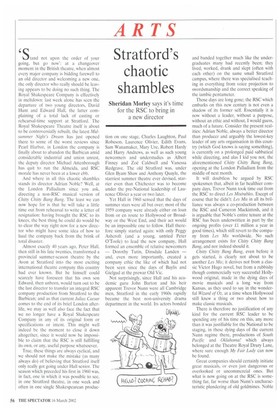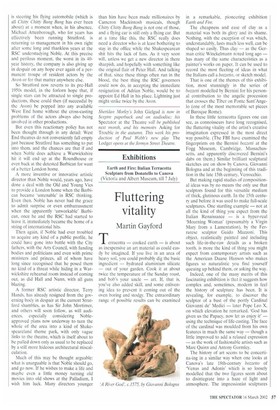Stratford's chaotic shambles
Sheridan Morley says it's time for the RSC to bring in a new director Stand not upon the order of your going, but go now': at a changeover moment in the British theatre, when almost every major company is bidding farewell to an old director and welcoming a new one, the only director who really should be leaving appears to be doing no such thing. The Royal Shakespeare Company is effectively in meltdown: last week alone has seen the departure of two young directors, David Hunt and Edward Hall, the latter complaining of a total lack of casting or rehearsal-time support at Stratford. The Royal Shakespeare Theatre itself is about to be controversially rebuilt, the latest Midsummer Night's Dream has just opened there to some of the worst reviews since Pearl Harbor, in London the company is finally about to abandon the Barbican amid considerable industrial and union unrest, the deputy director Michael Attenborough has quit to run the Almeida, and RSC morale has never been at a lower ebb.
And where in all this chaotic shambles stands its director Adrian Noble? Well, at the London Palladium since you ask, directing a non-RSC musical version of Chitty Chitty Bang Bang. The least we can now hope for is that he will take a little time out from rehearsal to write a letter of resignation: having brought the RSC to its knees, the best thing he could do would be to clear the way right now for a new director who might have some idea of how to haul the company back from the brink of total disaster.
Almost exactly 40 years ago, Peter Hall, then still in his late twenties, transformed a provincial summer-season theatre by the Avon at Stratford into the most exciting international theatre company this country had ever known. But he himself could scarcely have foreseen that his own son Edward, then unborn, would turn out to be the last director to transfer an integral RSC company production from Stratford to the Barbican; and as that current Julius Caesar comes to the end of its brief London afterlife, we may as well also face the fact that we no longer have a Royal Shakespeare Company in any of its original form or specifications or intent_ This might well indeed be the moment to close it down altogether, since it would now be impossible to claim that the RSC is still fulfilling its own, or any, useful purpose whatsoever.
True, these things are always cyclical, and we should not make the mistake (as many always do) of believing that Stratford itself only really got going under Hall senior. The season which preceded his first in 1960 was, in fact, one in which it was possible to see, in one Stratford theatre, in one week and often in one single Shakespearean produc tion on one stage, Charles Laughton, Paul Robeson. Laurence Olivier, Edith Evans, Sam Wanamaker, Mary Ure, Robert Hardy and Harry Andrews, as well as such young newcomers and understudies as Albert Finney and Zoe Caldwell and Vanessa Redgrave. The old Stratford was, under Glen Byam Shaw and Anthony Quayle, the starriest summer theatre ever devised, starrier even than Chichester was to become under the pre-National leadership of Laurence Olivier a year or two later.
Yet Hall in 1960 sensed that the days of summer stars were all but over most of the 1959 company were already either on loan from or en route to Hollywood or Broadway or the West End, and their act would be an impossible one to follow. Hall therefore simply started again: with only Peggy Ashcroft (and a young, untried Peter O'Toole) to lead the new company, Hall formed an ensemble of relative newcomers — Dorothy Tutin, Dinsdale Landen — and, even more importantly, created a company ethic the like of which had not been seen since the days of Baylis and Gielgud at the prewar Old Vic.
Not surprisingly, since Hall and his academic guru John Barton and his heir apparent Trevor Nunn were all Cambridge men, Stratford in the early 1960s rapidly became the best non-university drama department in the world. Its actors bonded and banded together much like the undergraduates many had recently been; they lived, worked, drank and slept (often with each other) on the same small Stratford campus, where there was specialised teaching in everything from voice projection to swordsmanship and the correct speaking of the iambic pentameter.
Those days are long gone; the RSC which embarks on this new century is not even a shadow of its former self. Essentially it is now without a leader, without a purpose, without an ethic and without, I would guess, much of a future. Consider the present realities: Adrian Noble, always a better director than producer and arguably the lowest-key leader of any arts organisation in this country (which God knows is saying something), is currently on a prolonged paid sabbatical while directing, and alas I kid you not, the aforementioned Chitty Chitty Bang Bang, opening at the London Palladium from the middle of next month.
It will doubtless be argued by RSC spokesmen that, albeit in far healthier company days, Trevor Nunn took time out from the RSC to direct Les Miserables. Except of course that he didn't: Les Mis in all its brilliance was always a co-production between the RSC and Cameron Mackintosh, and it is arguable that Noble's entire tenure at the RSC has been underwritten in part by the ongoing profits (over .E1 million a year in good times), which still revert to the company from Les Mis worldwide. No such arrangement exists for Chitty Chitty Bang Bang, and nor indeed should it.
Chitty Chitty Bang Bang, even before it gets started, is clearly not about to be another Les Mis; it derives not from a classic Victor Hugo novel, but from a rubbishy though commercially very successful Hollywood original, made in the dying days of movie musicals and a long way from Kansas, as they used to say in the wonderful Wizard of Oz, at a time when Hollywood still knew a thing or two about how to make classic musicals.
There is therefore no justification of any kind for the current RSC leader to be spending any of his time on this, any more than it was justifiable for the National to be staging, in these dying days of the current Nunn regime there, productions of South Pacific and Oklahoma! which always belonged at the Theatre Royal Drury Lane, where sure enough My Fair Lady can now be found.
Great companies should certainly initiate great musicals, or even just dangerous or overlooked or uncommercial ones. But what is now going on at the RSC is something far, far worse than Nunn's uncharacteristic plundering of old goldmines. Noble is steering his flying automobile (which is all Chitty Chitty Bang Bang has ever been about) at a moment when, in his absence, Michael Attenborough, who for years has effectively been running Stratford, is returning to management in his own right after some long and thankless years at the RSC understudying Noble. At this precise and perilous moment, the worst in its 40year history, the company is also giving up in despair on any hope ever again of a permanent troupe of resident actors by the Avon or for that matter anywhere else.
So Stratford now reverts to its pre-Hall 1950s model, in the forlorn hope that, if single stars can be attracted to single productions, these could then (if successful by the Avon) be popped into any available West End home without the cross-casting problems of the actors always also being involved in other productions.
But even this reactionary policy has not been thought through in any detail: West End theatres do not conveniently fall empty just because Stratford has something to put into them, and the chances are that if and when Noble does achieve a Warwickshire hit it will end up at the Roundhouse or even back at the detested Barbican for want of a better London home.
A more inventive or innovative artistic director than Noble would, years ago, have done a deal with the Old and Young Vies to provide a London home when the Barbican became 'untenable' in RSC thinking. Even then, Noble has never had the grace to admit surprise or even embarrassment when the apparently 'unworkable' Barbican, once he and the RSC had started to leave it, immediately became the home of a string of international hits.
Then again, if Noble had ever troubled to acquire any kind of a public profile, he could have gone into battle with the City fathers, with the Arts Council, with funding bodies and politicians and even with prime ministers and princes, all of whom have long since recognised that he posed them no kind of a threat while hiding in a Warwickshire rehearsal room instead of coming out. as did Hall and Nunn, with all guns blazing.
A former RSC artistic director, Terry Hands, has already resigned from the governing body in despair at the current Stratford shambles, as has •Sir John Mortimer, and others will soon follow, as will audiences, especially considering Nobleapproved plans now underway to turn the whole of the area into a kind of Shakespeare land theme park, with only vague links to the theatre, which is itself about to be pulled down only as usual to be replaced by a still more hideous architectural miscalculation.
Much of this may be thought arguable: what is unarguable is that Noble should go, and go now. If he wishes to make a life and maybe even a little money turning old movies into old shows at the Palladium, I wish him luck. Many directors younger than him have been made millionaires by Cameron Mackintosh musicals, though Chitty Chitty Bang Bang is not one of those, and a flying car is still only a flying car. But at a time like this, the RSC really does need a director who is at least bothering to stay in the office while the Shakespearean shit hits the lack of fans. As it very soon will, unless we get a new director in there sharpish, and hopefully with something like the original flair of Peter Hall. And talking of that, since these things often run in the blood, the best thing the RSC governors could now do, in accepting the immediate resignation of Adrian Noble, would be to appoint Ed Hall in his place. Lightning just might strike twice by the Avon.
Sheridan Morley's John Gielgud is now in Sceptre paperback and on audiodisc; his Spectator at the Theatre will be published next month, and his memoirs Asking for Trouble in the autumn. This week his production of Paul Webb's new play The Lodger opens at the Jermyn Street Theatre.

















































































 Previous page
Previous page